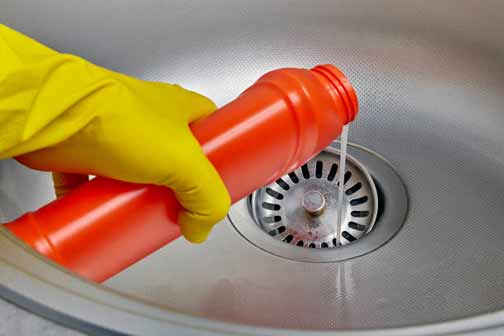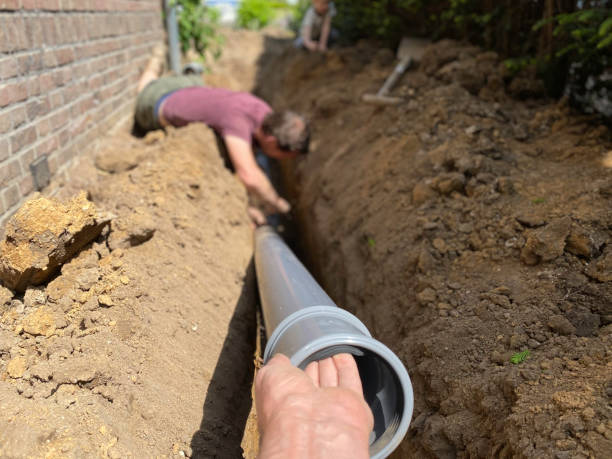Understanding the Importance of Sewer Line Maintenance for Homeowners
Maintaining your sewer lines is crucial for the overall health and functionality of your home’s plumbing system. Sewer line issues can lead to unpleasant odors, slow drains, and even severe water damage if not addressed promptly. Regular maintenance helps prevent these problems and ensures your sewer system operates efficiently.
By understanding the significance of sewer line maintenance, homeowners can take proactive measures to avoid costly repairs and maintain a healthy living environment.
Identifying Common Sewer Line Problems and Their Causes
Before we get into maintenance tips, it’s essential to recognize common sewer line issues. These include blockages caused by grease buildup, tree root intrusion, aging pipes, and foreign objects. Identifying these problems early can save you from costly repairs and extensive damage. Grease buildup often results from improper disposal of cooking fats and oils, while tree roots can infiltrate pipes through small cracks.
Aging pipes may corrode or collapse over time, and foreign objects flushed down toilets or drains can cause blockages. By understanding these common issues and their causes, homeowners can take preventive measures to protect their sewer lines.
Conducting Regular Inspections: A Preventive Measure
Conducting regular inspections is a proactive approach to sewer line maintenance. Use a sewer camera to inspect the interior of your pipes and identify potential issues. This allows you to address minor problems before they escalate into major repairs. Regular inspections can reveal early signs of blockages, leaks, and structural damage, enabling homeowners to take timely action.
Additionally, inspecting sewer lines during seasonal changes can help identify vulnerabilities caused by temperature fluctuations. By incorporating regular inspections into your maintenance routine, you can ensure the longevity and efficiency of your sewer system.
DIY Cleaning Solutions for Sewer Lines: Effective and Budget-Friendly
One of the most cost-effective ways to maintain your sewer lines is by using DIY cleaning solutions. A mixture of baking soda and vinegar can help break down grease and other buildup in your pipes. Pour half a cup of baking soda followed by half a cup of vinegar down the drain, let it sit for 30 minutes, and then flush with hot water. This natural cleaning solution is safe for your pipes and effective in preventing blockages.
Additionally, using a plunger or a drain snake can help clear minor clogs without the need for professional assistance. By incorporating DIY cleaning solutions into your maintenance routine, you can keep your sewer lines clear and functional without incurring high costs.
Using Enzyme Cleaners for Preventive Maintenance
Enzyme cleaners are an excellent option for maintaining sewer lines on a budget. These cleaners contain natural bacteria and enzymes that break down organic matter in your pipes. Use enzyme cleaners monthly to prevent buildup and keep your sewer lines clear. Unlike chemical cleaners, enzyme cleaners are safe for your pipes and the environment.
They work by digesting organic materials such as grease, food particles, and hair, preventing blockages and odors. By incorporating enzyme cleaners into your maintenance routine, you can ensure the long-term health of your sewer system.
Avoiding Harmful Chemicals: Protecting Your Pipes and the Environment
While it may be tempting to use chemical drain cleaners for quick fixes, they can cause more harm than good. These chemicals can corrode your pipes, leading to costly repairs. Stick to natural cleaning solutions and enzyme cleaners to maintain your sewer lines safely. Chemical cleaners can also harm the environment by contaminating water sources and harming aquatic life.
By avoiding harmful chemicals, you protect your pipes, your health, and the environment. Opt for eco-friendly alternatives that effectively maintain your sewer lines without causing damage.

Implementing Proper Disposal Practices to Prevent Blockages
One of the simplest ways to maintain your sewer lines is by practicing proper disposal habits. Avoid pouring grease, oil, and food scraps down the drain. Dispose of these items in the trash instead. Additionally, use a drain strainer to catch hair and other debris that can cause blockages. Educate household members about what should and should not be flushed or washed down the drain. Items such as wet wipes, feminine hygiene products, and paper towels should be disposed of in the trash.
By implementing proper disposal practices, you can prevent blockages and ensure the smooth operation of your sewer system.
Addressing Tree Root Intrusion: Prevention and Solutions
Tree roots can infiltrate your sewer lines, causing blockages and damage. To prevent this, avoid planting trees and shrubs near your sewer lines. If you suspect tree root intrusion, use a root killer product to eliminate the roots without harming your pipes. Regularly inspect your yard for signs of tree root intrusion, such as slow drains, gurgling noises, and lush patches of grass.
If you notice any of these signs, take immediate action to prevent further damage. Speaking with a professional plumber can also help identify and address tree root intrusion effectively. By taking preventive measures and addressing tree root issues promptly, you can protect your sewer lines and avoid costly repairs.
Repairing Minor Leaks Promptly to Prevent Major Issues
Even small leaks can lead to significant sewer line problems if left unaddressed. Regularly check for signs of leaks, such as damp spots in your yard or an unexplained increase in your water bill. Repair minor leaks promptly to prevent further damage and costly repairs. Leaks can weaken the structural integrity of your pipes, leading to collapses or bursts.
By addressing leaks early, you can avoid extensive damage and ensure the longevity of your sewer system. Use pipe repair kits or speak with a professional plumber to detect and fix leaks effectively. Regularly inspecting your pipes and addressing leaks promptly is a crucial aspect of sewer line maintenance.
Scheduling Professional Inspections for Comprehensive Assessments
While DIY maintenance is essential, scheduling professional inspections is equally important. A licensed plumber can provide a thorough inspection of your sewer lines and identify issues that may not be visible to the naked eye. Aim for professional inspections every two to three years.
Professional plumbers use advanced tools and techniques to assess the condition of your sewer lines, detect hidden problems, and recommend appropriate solutions. By scheduling regular professional inspections, you can ensure the long-term health of your sewer system and prevent unexpected issues.
Understanding the Benefits of Hydro Jetting for Sewer Line Cleaning
Hydro jetting is a highly effective method for cleaning sewer lines. This process uses high-pressure water to remove buildup, debris, and tree roots from your pipes. While hydro jetting may involve an upfront cost, it can save you money in the long run by preventing major sewer line issues.
Hydro jetting is particularly effective for removing stubborn blockages and restoring the full capacity of your pipes. It is a safe and environmentally friendly cleaning method that does not rely on chemicals. By understanding the benefits of hydro jetting, homeowners can make informed decisions about maintaining their sewer lines effectively.
Knowing When to Replace Sewer Lines: Signs and Solutions
In some cases, replacing your sewer lines may be necessary. Aging pipes, extensive damage, and recurring issues are signs that replacement might be the best option. Speak with a professional plumber to determine if replacement is needed and explore budget-friendly options. Signs that indicate the need for replacement include frequent blockages, persistent leaks, and foul odors.
Replacing sewer lines can be a significant investment, but it ensures the long-term functionality and safety of your plumbing system. By knowing when to replace your main sewer line, you can avoid ongoing issues and costly repairs.

Maintaining Sewer Lines During Seasonal Changes
Seasonal changes can impact your sewer lines, especially during winter. Insulate exposed pipes to prevent freezing and bursting. Additionally, ensure that your gutters and downspouts are clear to prevent water from pooling around your sewer lines.
During the fall, clear leaves and debris from your yard to prevent blockages in your sewer system. In the spring, inspect your sewer lines for any damage caused by freezing temperatures and take necessary repairs. By maintaining your sewer lines during seasonal changes, you can prevent weather-related issues and ensure the year-round functionality of your plumbing system.
Creating a Sewer Line Maintenance Schedule for Consistent Care
Establishing a regular maintenance schedule is key to keeping your sewer lines in top condition. Set reminders for monthly enzyme cleanings, quarterly DIY inspections, and bi-annual professional inspections. Consistent maintenance helps prevent unexpected issues and costly repairs. By creating a maintenance schedule, homeowners can stay organized and ensure that all necessary tasks are completed on time.
Regular maintenance not only extends the lifespan of your sewer lines but also provides peace of mind knowing that your plumbing system is well-maintained. By following a maintenance schedule, you can effectively manage your sewer line care and avoid last-minute emergencies.
Educating Household Members on Proper Sewer Line Maintenance
Educating everyone in your household about proper disposal practices and sewer line maintenance can go a long way in preventing issues. Ensure that everyone understands the importance of not flushing foreign objects and using the garbage disposal responsibly. Teach children and other family members about what can and cannot be disposed of in the sink or toilet.
By fostering good habits and awareness, you can reduce the risk of blockages and damage to your sewer lines. Encourage open communication about any plumbing issues and address them promptly. By educating household members, you create a collaborative effort in maintaining your sewer system.
Budgeting for Future Sewer Line Maintenance and Repairs
While maintaining your sewer lines on a budget is possible, it’s essential to allocate funds for future maintenance and repairs. Set aside a portion of your budget for regular inspections, cleaning products, and potential repairs to avoid financial strain. Unexpected sewer line issues can be costly, but having a dedicated budget can help manage expenses without compromising your financial stability.
Consider setting up a savings account specifically for home maintenance and contribute to it regularly. By budgeting for future sewer line maintenance, you can be prepared for any eventualities and ensure the long-term health of your plumbing system.
Utilizing Community Resources for Sewer Line Maintenance Support
Many communities offer resources and programs to help homeowners maintain their sewer lines. Check with your local government or utility company for information on available grants, rebates, or assistance programs for sewer line maintenance. Some communities provide free or discounted inspections, educational workshops, and financial aid for repairs. By taking advantage of these resources, homeowners can reduce the cost of maintaining their sewer lines and access valuable support.
Stay informed about community initiatives and participate in programs that promote responsible sewer line maintenance. By utilizing community resources, you can enhance your maintenance efforts and benefit from collective knowledge and assistance.
Understanding the Environmental Impact of Sewer Line Maintenance
Maintaining your sewer lines not only benefits your home but also has a positive impact on the environment. Proper maintenance helps prevent leaks and contamination of groundwater, reducing the risk of environmental damage. By taking proactive steps, you contribute to a healthier ecosystem. Preventing blockages and leaks ensures that wastewater is properly treated and disposed of, minimizing pollution.
Additionally, using eco-friendly cleaning products and avoiding harmful chemicals protect water sources and aquatic life. By understanding the environmental impact of sewer line maintenance, homeowners can make responsible choices that benefit both their homes and the planet.
Summing It Up
Maintaining your sewer lines on a budget is achievable with a proactive approach and the right strategies. Regular inspections, DIY cleaning solutions, proper disposal practices, and professional assistance are key components of effective sewer line maintenance. By following these steps, you can prevent costly repairs, ensure the longevity of your sewer system, and contribute to a healthier environment.
Emphasizing preventive maintenance not only saves money but also provides peace of mind knowing that your plumbing system is well-maintained. By taking a comprehensive and informed approach to sewer line care, homeowners can enjoy a functional and efficient plumbing system for years to come.


